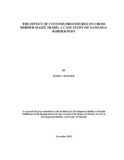| dc.description.abstract | Traders who use formal trading routes across national borders are required to comply with
laid down customs procedures. Such procedures often consist of documentary and
administrative processes, which traders have to follow whether they understand them or not
if they are to be allowed to participate in cross border trade. These procedures are said to
affect both the volume of trade and the choice of route taken by some traders. This research
looks at traders‟ perceptions regarding customs procedures and how these affect their
participation in cross border maize trade.
Carried out at the Namanga border post in Kenya, the research took a qualitative approach,
which enabled the researcher to gain deeper understanding of how customs procedures
affect cross border maize trade. Cross border maize traders were the key respondents. They
are directly affected by customs procedures irrespective of their understanding of such
processes. The researcher used a purposive sampling approach in identifying the
respondents and other key informants that were interviewed. Apart from traders, a number of
other key players in cross border trade were interviewed. These included clearing agents and
officials of Kenya Revenue Authority, Kenya Plant Health Inspectorate Service, Kenya
Bureau of Standards and Port Health. These were interviewed to gauge their understanding
of the effect of customs procedures on cross border maize trade.
Traders consisted of a mix of small and large ones depending on the volume of maize they
dealt in at any given time. Of the eleven traders that were interviewed, two were women. Of
the two women, one was involved in formal cross border trade.
Findings are presented in thematic areas such as nature of cross border trade,
characteristics of cross border maize traders, trade facilitating agents, customs procedures
as well as formality and informality of trade.
Some of the key findings included the discovery of traders‟ diverse understanding of customs
procedures. A number of the traders said their understanding of customs of procedures was
little while others portrayed good understanding of these procedures. All the traders
interviewed but one said they hired clearing agents to handle the customs clearance
processes on their behalf. The traders are subjected to similar procedures apart from those
with previous customs offences. These are subjected to very rigorous and lengthy verification
processes.
These findings enlarge the basket of knowledge available on formal cross border maize trade
in East Africa. Equally, it is anticipated that policy makers would refer to such findings when
planning to put in place policies or measures to support cross border maize trade in East
Africa | en_US |

